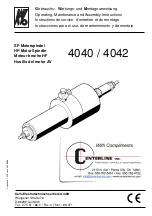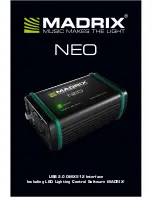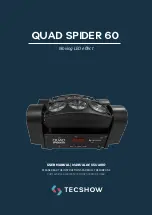
Section 3: Operating Instructions
AFM4214 and AFM4216 All-Flex Grooming Mowers 315-587M
11/19/21
28
•
Always disengage tractor PTO before raising mower decks
to transport position to avoid power train damage, injury
from thrown objects, or blade contact.
•
Do not operate a broken or bent driveline. Such a driveline
will break apart while rotating at high speeds. Always
remove the implement from use until the damaged driveline
•
Do not alter implement or replace parts on the implement
with other brands. Other brands may not fit properly or
meet OEM (Original Equipment Manufacturer)
specifications. They can weaken the integrity and impair the
safety, function, performance, and life of the implement.
Replace parts only with genuine OEM parts.
•
Do not use implement as a man lift, work platform or as a
wagon to carry objects. It is not properly designed or
•
Do not use implement to lift objects; to pull objects such as
fence posts, stumps, etc; or to push objects. The unit is not
designed or guarded for these uses.
•
High wear may occur to mower blades when mowing in
areas with sandy soil. Frequent inspection should be made
and blades replaced if worn excessively or damaged.
•
Buildup of debris around moving components and
gearboxes is a fire hazard. Keep rotating parts and
•
Improper oil level can cause bearing failure and be a fire
hazard. Maintain proper gearbox oil level.
•
Avoid catching hydraulic hoses on brush, posts, tree limbs,
and other protrusions that could damage and/or break them.
•
Use mower to cut only turf grasses. Cutting other materials
can damage drive components, cutting blades, and deck.
•
Some tractors are equipped with two power take-off speeds.
Be certain your tractor’s power take-off shaft is set-up to
operate at 540 rpm. Do not exceed 540 rpm power take-off
speed. Excessive speed can damage drive components,
cutter blades, and/or increase the risk of a thrown object
Tractor & Mower Inspection
Make the following inspections with mower attached to a
tractor, with tractor and mower parked on a level surface,
power take-off disengaged, and mower blades stopped.
1. Complete
2. Make sure hitch safety chain is securely attached to
mower and tractor.
3. Grease driveline shaft and all other grease fittings.
4. Check oil level in gearboxes. Refer to
5. Check all plugs and caps in gearboxes to make
certain that they have been replaced and tightened
properly.
6. Check mower blades for sharpness and damage.
on page 36.
7.
Be sure blades are installed properly on each deck
with the cutting edge leading in rotation. See
8. Make sure all blade bolts are tight. Know which
center blade bolts are left-hand threaded and which
are right-hand threaded when checking for tightness.
“Blade Removal & Installation”
9. Be sure all bolts and nuts are tight.
10. Be certain all guards and shields are in place and
secure.
11. If the deck drivelines do not have slip clutches, then
check U-joint timing. Refer to
12. Slowly cycle all decks to transport position checking
to make sure hydraulic hoses and wire harness are
not pinched in the process.
13. Check LED lights to make sure they are hooked-up
correctly and functioning:
a. Check all electrical connections on the wire
on page 19.
b. Check wire harness to make sure the wires are
not pinched, bare, or broken and connectors are
not damaged. Replace wire harness if damaged.
c. Check lens modules for broken lens and/or burnt
out LED lights. Replace module if needed.
Modules are available in amber, red, and black.
d. Make necessary repairs and repeat step 13
above.
14. Clear area to be mowed of objects and debris that
might be picked up and thrown by the mower blades
15. Operate with 540 rpm power take-off tractor.
16. Refer to your tractor’s operator manual for engaging
and disengaging the power take-off.
17. In case of emergency, learn to stop tractor and
mower quickly.
















































